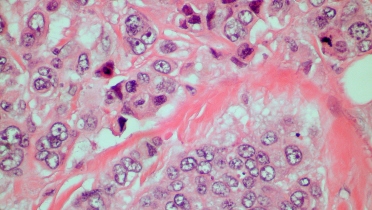ASCO Updates Guidelines for Pembrolizumab Treatment in Patients with Early-Stage TNBC
ASCO issued a rapid recommendations update regarding the use of pembrolizumab as a treatment for patients with high-risk, early-stage triple-negative breast cancer.
The guideline update, published in Journal of Clinical Oncology, endorsed the use of neoadjuvant pembrolizumab plus chemotherapy in patients proceeding to surgery, followed by adjuvant pembrolizumab.
The guideline results from an interim analysis of the KEYNOTE-522 clinical trial, which evaluated neoadjuvant treatment with chemotherapy plus pembrolizumab (n = 784) or placebo (n = 390), followed by a yearlong adjuvant course of pembrolizumab or placebo after surgical resection.
The median follow-up was 39.1 months. The updated results show assignment to pembrolizumab was associated with a significant improvement in 3-year event-free survival compared with placebo (84.5% vs. 76.8%; HR = 0.63; 95% CI, 0.48-0.82; P < .001). The 36-month overall survival estimates were 89.7% for patients assigned pembrolizumab and 86.9% for patients assigned placebo.
At the time of reporting, 80 deaths were recorded in the pembrolizumab arm, and 55 deaths were recorded in the placebo arm (HR for death = 0.72; 95% CI, 0.51-1.02).
Similar rates of grade 3 or higher treatment-related adverse events were seen in both arms (pembrolizumab vs placebo, 77.1% vs 73.3%), with the majority of adverse events occurring during neoadjuvant treatment.
Among patients assigned to pembrolizumab in the KEYNOTE-522 trial, the rate of grade 3 or higher immune-mediated adverse events was 12.9%, compared to 1% in the placebo arm. Patients assigned pembrolizumab also had a higher rate of endocrine disorders of any grade (26.8% vs 9.1%).
“For patients with T1cN1-2 or T2-4N0 (stage 2 or 3), early-stage triple-negative breast cancer, the panel recommends use of pembrolizumab (200 mg once every 3 weeks or 400 mg once every 6 weeks) in combination with neoadjuvant chemotherapy, followed by adjuvant pembrolizumab after surgery,” the authors wrote.
In a qualifying statement, the authors noted that adjuvant capecitabine without pembrolizumab has shown independent benefits for patients with triple-negative breast cancer, and the adjuvant olaparib has also exhibited efficacy in patients with germline BRCA mutations. There is currently no evidence to recommend pembrolizumab in combination with capecitabine or olaparib in the adjuvant setting.
Disclosures: Some authors declared financial ties to drugmakers. See full study for details.
Reference:
https://ascopubs.org/doi/full/10.1200/JCO.22.00503
By Cameron Kelsall, MD /alert Contributor
.jpg)















.jpg)
.jpg)
.jpg)
.jpg)
.jpg)

.jpg)
.jpg)
.jpg)
.jpg)
.jpg)
.jpg)



.jpg)
.jpg)

.jpg)
.jpg)
.jpg)
.jpg)

.jpg)
.jpg)


.jpg)


.jpg)

.jpg)
.jpg)
.jpg)
.jpg)
.jpg)
.jpg)
.jpg)
.jpg)
.jpg)

.jpg)
.jpg)

.jpg)
.jpg)
.jpg)

.jpg)
.jpg)
.jpg)
.jpg)
.jpg)
.jpg)

.jpg)

.jpg)
.jpg)
.jpg)
.jpg)

.jpg)
.jpg)

.jpg)
.jpg)
.jpg)
.jpg)
.jpg)
.jpg)

.jpg)
.jpg)
.jpg)
.jpg)


.jpg)
_.jpg)



.jpg)
.jpg)

.jpg)
.jpg)
.jpg)

.jpg)
.jpg)

.jpg)

.jpg)

.jpg)
.jpg)
.jpg)
.jpg)

.jpg)

.jpg)
.jpg)

.jpg)
.jpg)
.jpg)
.jpg)
 Featured Breast Cancer Videos
Featured Breast Cancer Videos.jpg)